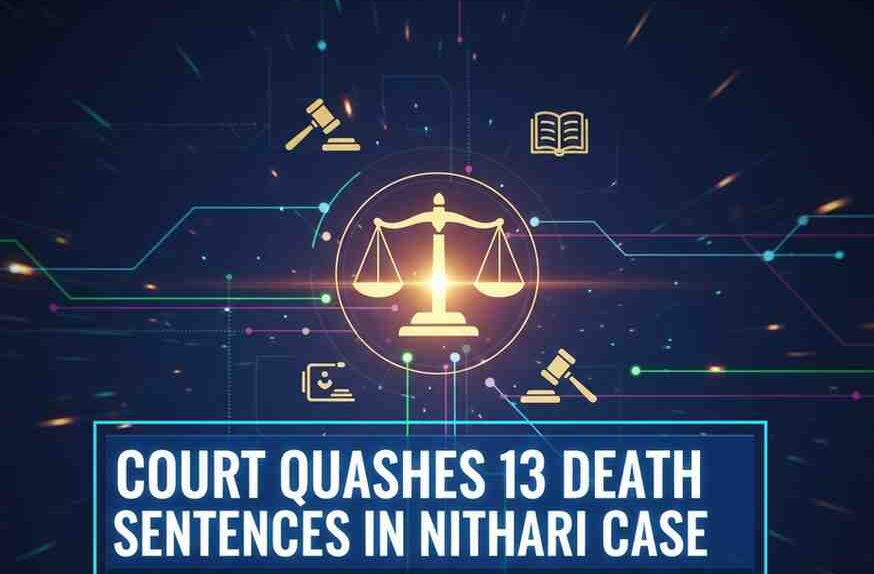Court Quashes 13 Death Sentences in Nithari Case: The High Court has overturned all 13 death sentences of Surinder Koli, the man once convicted in the 2006 Nithari serial killings. The court cited major flaws in the investigation and evidence. Here’s a full breakdown of the ruling, reasons, and its wider impact.
The Shocking Case That Shook the Nation
The Nithari killings of 2005–2006 remain one of India’s darkest criminal chapters. Dozens of children and women went missing from a neighbourhood in Noida, and later, human remains were discovered near a bungalow in Nithari village. The investigation led police to Surinder Koli, a domestic worker employed by businessman Moninder Singh Pandher.
Koli was accused of abducting, assaulting, murdering, and disposing of victims’ remains in the backyard drain. Between 2009 and 2014, he was convicted in multiple cases and handed 13 separate death sentences. Pandher was also charged but acquitted in most cases. For years, the case symbolised public outrage over violent crimes against children.
Court’s Finding: “Evidence Too Weak to Sustain Conviction”
In a major judicial reversal, the High Court set aside all of Koli’s death penalties. The judges noted several inconsistencies and lapses that rendered the convictions unreliable.
Forensic and Documentary Gaps
The court highlighted that much of the prosecution’s case relied on circumstantial evidence without a clear scientific linkage. Several pieces of material evidence — such as bones, clothes, and personal items recovered from the drain — were never conclusively connected to the victims or to Koli through DNA or fingerprint tests.
Procedural Errors in Investigation
The bench observed that the police failed to follow proper legal procedure during evidence collection and confession recording. Recovery statements were not in full compliance with the Evidence Act, and the chain of custody for crucial items was broken. Delays in sealing the crime scene and a lack of independent witnesses further weakened the case.
Contradictions and Missing Links
The court found contradictions between police statements, witness accounts, and forensic records. In some cases, the same evidence was used to justify different conclusions, creating inconsistencies. The judges stated that such “contradictory use of the same material cannot sustain the most severe punishment under law.”
Supreme Court Affirms Acquittal
In November 2025, the Supreme Court upheld the High Court’s findings and ordered Koli’s release. The bench made it clear that suspicion, however strong, cannot replace proof beyond a reasonable doubt. The judges emphasised that when investigative agencies compromise on procedure, the credibility of even serious cases collapses.
The Supreme Court expressed regret that the true perpetrators of the Nithari murders were never conclusively identified. It was observed that the case represented a serious failure in professional investigation and scientific evidence gathering.
Why the Verdict Matters
This ruling has far-reaching consequences for India’s justice system.
- Reaffirming due process: Even in heinous crimes, courts must uphold fair trial standards. The right to life and liberty under Article 21 cannot be curtailed without irrefutable proof.
- Raising standards for death penalty cases: The judgment reinforces that capital punishment requires an exceptionally high threshold of evidence.
- Highlighting investigative reform: The verdict underlines the urgent need for scientific forensics, digital tracking, and professional accountability in criminal probes.
- Balancing justice and human rights: While victims’ families continue to seek closure, the ruling shows that justice cannot rely on flawed investigations or coerced confessions.
FAQ: High Court Quashes 13 Death Sentences in Nithari Case
Why were Surinder Koli’s death sentences overturned?
The court found serious lapses in evidence handling, unreliable witness statements, and procedural violations that undermined the case’s credibility.
Is Koli now completely free?
Yes. The Supreme Court ordered his release, stating there was no remaining conviction against him unless new charges exist.
What message does this ruling send about the death penalty?
It reinforces that the death penalty should be imposed only when guilt is proven beyond all reasonable doubt, supported by flawless evidence and lawful process.
Conclusion
The reversal of Surinder Koli’s death sentences is a landmark in India’s criminal jurisprudence. It demonstrates that even in cases of horrifying crimes, justice must rest on proof, not presumption. The Nithari case will now be remembered not only for its brutality but also as a reminder that the rule of law protects every individual — even the accused — from the consequences of a flawed investigation.

























